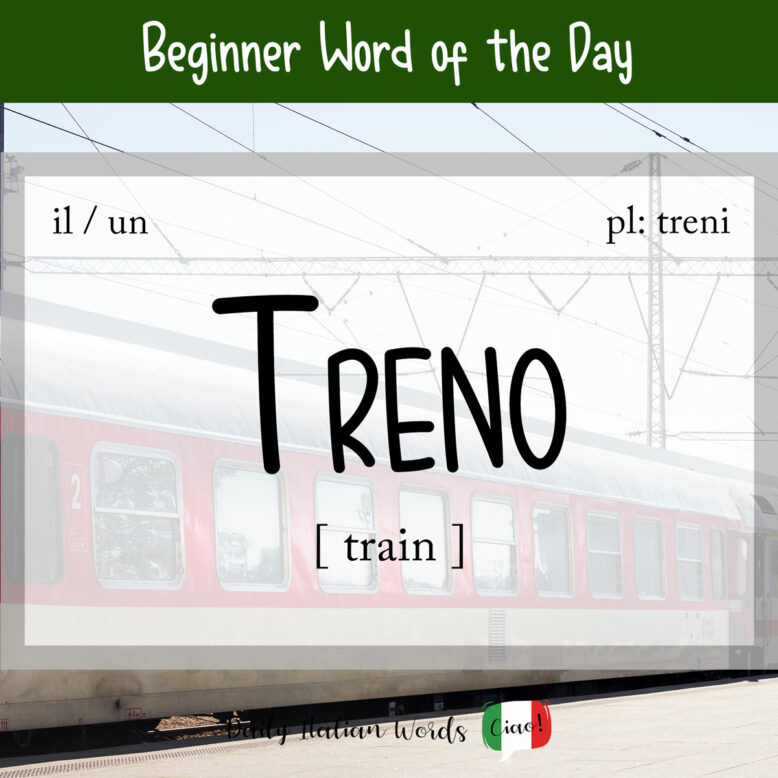The word for train in Italian is, you guessed it, treno (masculine, plural: treni). It entered the language via the French word train, which in turn comes from the verb traîner meaning to drag.

Some common verbs you will see used with treno include:
- andare in treno = to go by train
- viaggiare in treno = to travel by train
- prendere il treno = to take the train
- perdere il treno = to miss the train
- salire sul treno = to get on the train
- scendere dal treno = to get off the train
Viaggiare in treno può essere veloce quanto prendere un aereo.
Traveling by train can be as fast as taking a plane.

If a train is on time, you would say it is in orario, and if it is late, you would say it is in ritardo. On the rare occasion that a train actually arrives early, you would say it is in anticipo.
Mi scusi, quando arriva il treno per Milano? – È in ritardo di 15 minuti. Dovrebbe arrivare alle sei e trentacinque.
Excuse, when does the train for Milan arrive? – It is 15 minutes late. It should arrive at 6.35.
In Italy, there are three high-speed train services operated by Trenitalia, the primary train operator in Italy. The Frecciarossa (literally, Red Arrow) is the fastest train, travelling at a maximum of 300km/h, followed by the Frecciargento (literally, Silver Arrow) at 250km/h, and the Frecciabianca (literally, White Arrow) at 200km/h or 250km/h.
Some other kinds of trains include:
- treno locale = local train
- treno regionale = regional train
- treno regionale veloce = fast regional train
- treno rapido = fast train
- treno diretto = direct train
- intercity = intercity train (fast lines between big cities, the name is used in various European countries)
- treno passeggeri = passenger train
- treno merci = freight train

Note that Italians often omit the word treno when talking about a specific category of train that is arriving or leaving. That includes the automatic announcements on the station platform. For example:
Il regionale delle undici e dieci è in arrivo sul binario due.
The 11:10 regional train is arriving at platform 2.
Other types of specialised trains you might hear about are:
- treno corazzato = armoured train
- treno navetta = bilevel rail car / double-decker train
- treno ospedale = hospital train
- autotreno = road train
An attraction that draws in visitors and trainspotters (amanti / fan dei treni) from all over the world are steam trains (treni a vapore), most of which operate exclusively on special occasions. For example, back in the October of 2012, we had the chance to ride the steam train that travels between Torino and Bra.

If you are passionate about trains, you might also be interested in railway modelling (modellismo ferroviario), a hobby in which trains and other locomotives are modelled at a reduced scale. An alternative name is trenino (little train) which can also refer to a toy train for kids.
Treno has other meanings. For example it can refer to a set of objects (un treno di gomme = a set of tyres for a car).
The expression treno di vita (lit: train of life) refers to one’s style or way of life in an economic sense.
Idioms with the word ‘treno’
Andare come un treno
Literal meaning: to go like a train
English translation: to go / move very quickly
Arrivare con l’ultimo treno
Literal meaning: to arrive with the last train
English translation: to be late or slow to understand something or propose a solution
Perdere il treno
Literal meaning: to miss the train
English translation: to miss out on an opportunity
Heather Broster is a graduate with honours in linguistics from the University of Western Ontario. She is an aspiring polyglot, proficient in English and Italian, as well as Japanese, Welsh, and French to varying degrees of fluency. Originally from Toronto, Heather has resided in various countries, notably Italy for a period of six years. Her primary focus lies in the fields of language acquisition, education, and bilingual instruction.


